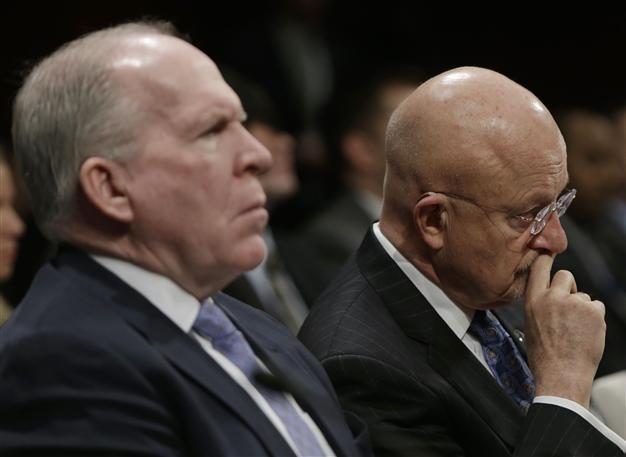Chemical weapons deal strengthened Assad: US intelligence chief
WASHINGTON - Reuters

Director of U.S. National Intelligence James Clapper (R) and CIA Director John Brennan (L) listen to opening remarks at the House Intelligence Committee on "Worldwide Threats", in Washington February 4, 2014. REUTERS Photo
Last year's agreement to eliminate Syria's chemical weapons left President Bashar al-Assad in a strengthened position, and there appears little chance rebels will soon force him from power, the U.S. intelligence chief told Congress on Tuesday."The prospects are right now that (Assad) is actually in a strengthened position than when we discussed this last year, by virtue of his agreement to remove the chemical weapons, as slow as that process has been," said James Clapper, director of national intelligence.
Clapper, testifying at a U.S. House of Representatives Intelligence Committee hearing, did not specify why the September agreement on chemical arms had boosted Assad's position.
But before the pact, worked out by the United States and Russia, the Obama administration had appeared on the verge of launching military strikes against Syria in reprisal for a poison gas attack in the Damascus suburbs that killed hundreds.
President Barack Obama in August 2011 called on Assad to give up power following the lethal suppression of anti-government protests by Syrian security forces.
Clapper said Assad's government is likely to remain in power, absent a diplomatic agreement for a new transitional government, which most analysts consider a long shot.
"I foresee kind of more of the same, sort of a perpetual state of a stalemate where ... neither the regime nor the opposition can prevail," he told the House Intelligence Committee.
Asked about Clapper's testimony, State Department spokeswoman Jen Psaki said the U.S. government has been "pretty clear and consistent" in acknowledging that Assad has been aided by an influx of foreign fighters and support from Iran.
But Syrian peace talks that opened in Switzerland last month have escalated pressure on Damascus, she said.
As for the chemical weapons deal, Psaki noted that a U.N. Security Council resolution calls on Syria to abide by it. "We will see if they deliver on the promises that have been made," she said.
Reuters reported last week that Syria has given up less than 5 percent of its chemical weapons arsenal and will miss this week's deadline to send all toxic agents abroad for destruction.
Clapper said the weapons removal was occurring at a "slow pace," and that two shipments totaling about 53 metric tons had left Syria so far.
Russia, Syria's ally, said on Tuesday that Damascus would soon ship more toxic agents abroad for destruction.
Under questioning from the House committee's chairman, Michigan Republican Mike Rogers, CIA Director John Brennan said that militants linked to al Qaeda had established training camps in Syria and Iraq that could be used to stage attacks both in the region and beyond.
"Syria presents a number of challenges to U.S. national security interests in terms of the potential spillover of the fighting inside of Syria to neighboring countries, but also, and increasingly so, concerns on the terrorism front," Brennan said.
















